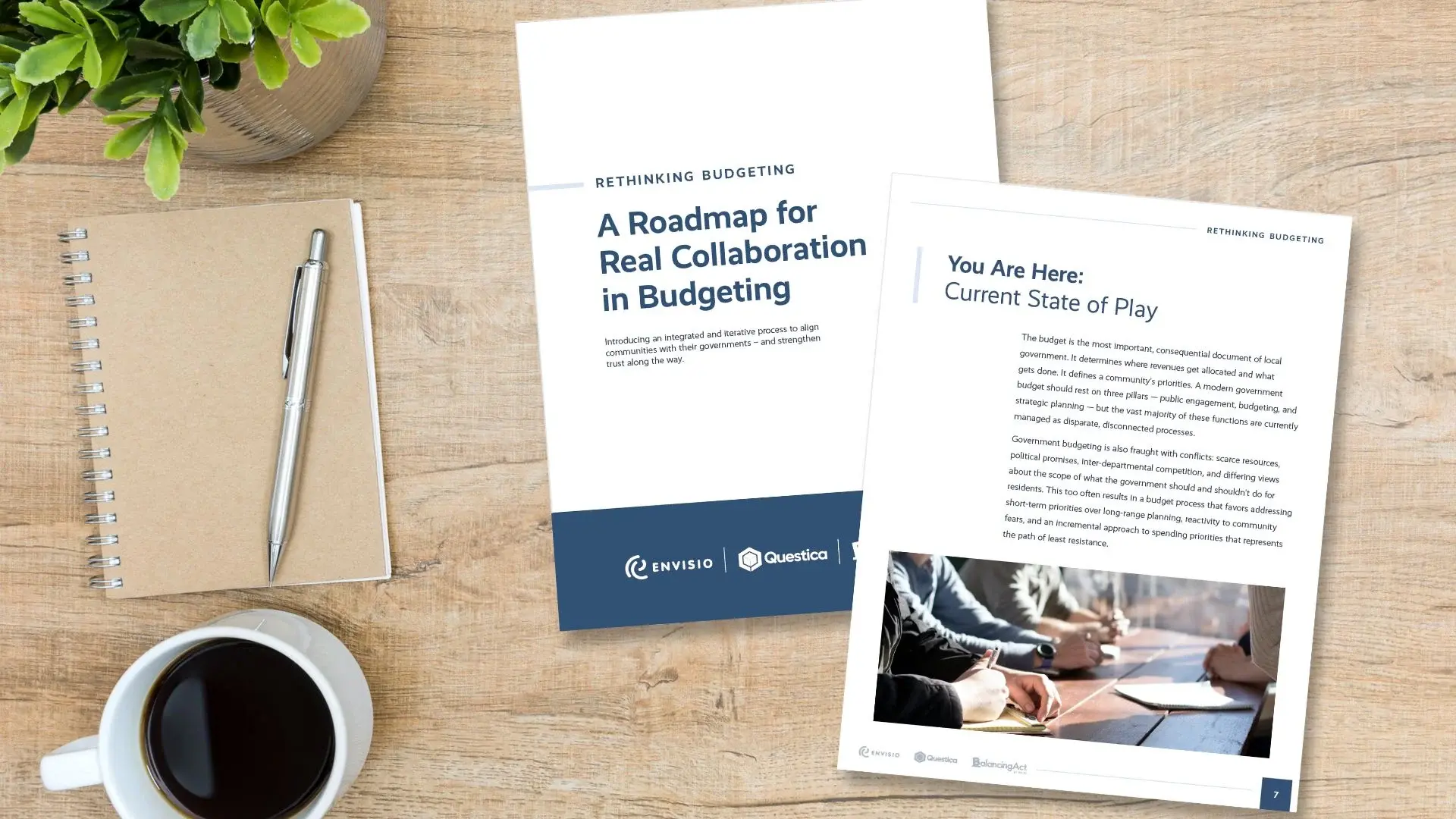Top Eight Local Government Innovations As We Emerge From COVID-19
By Polco on May 29, 2020

- By Ranier Ford, Polco/National Research Center-
This is part of a two part series on local government innovation as we emerge from COVID-19.
As we begin to enter a “New Normal” post-Covid, what are local governments doing to tackle the unprecedented shifts, challenges, and opportunities?
In a time when in-person meetings are canceled or postponed, it can be hard for local government leaders to gather. But with so many sweeping changes in our communities, sharing with colleagues is not only reassuring but also essential for moving forward thoughtfully.
The Forward Together Virtual Conference in May 2020 offered local government leaders nationwide an opportunity to share their experiences in facilitated discussions.
The overarching theme was innovation, with specific focus on topics such as remote work, serving at-risk communities, budgeting, resident communication, and data use. Participants shared the many ways COVID-19 has spurred their communities to apply creative solutions to complex problems.
1) Services and Processes Go Virtual
As a result of COVID-19, communities have moved many services and processes online. For example, communities are now doing everything from building inspections, permitting, and farmers' markets online.
2) New Uses For Old Things
Businesses have begun to serve different purposes and spaces have new uses. For example, manufacturers in New Orleans halted the production of festive Mardi Gras masks to make COVID masks. Several participants shared how distilleries have begun to make hand sanitizer.
Communities are beginning to hold public meetings at drive-in movie theaters and placing homeless people in motel rooms that are less conducive to COVID transmission due to the absence of interior hallway. One community converted an unused building with a drive-through into a socially distant property tax payment center.
3) Partnerships
To meet the needs of the community, partnerships are forming. For example, the LA Office of Community Development is partnering with a foundation to match all donations to serve more lunches to essential medical workers and COVID patients. Similarly, Mecklenburg County local government, foundations, and local restaurants are partnering to provide meals to children in need.
4) Remote Work
As a result of COVID-19, many employees have transitioned to remote work. Employees have been more productive working remotely than some thought possible. Remote work will likely persist into the future given benefits such as greater staff efficiency and flexibility.
Additionally, many participants shared positive experiences with virtual meetings.
“Meetings seem to go a lot quicker and are a lot smaller,” said Kathy Thake, Assistant to the Village Manager of Niles, Illinois. “It’s been a smooth transition. We’ve actually had more frequent meetings, which is good because more business gets done.”
5) Resident Communication
Local governments shared that residents often seek resources about parks and recreation, restaurants and grocery stores, general statistics and data, tips for health and fitness, and activities for staying at home. In addition to focusing on the information residents want, local governments are also delivering information in a variety of ways.
5) Support for At-Risk Communities
Many participants expressed concerns about the impact of COVID-19 on the elderly, poor, people of color, and homeless populations especially.
One local government’s solution to serving senior citizens has been to individually contact 800 members of a local senior center to identify their needs.
Other solutions include completing food assistance program orders online, increasing translation services in hospitals, providing seniors with designated shopping times and transportation.
6) Budget
Participants also shared concerns about present and future budget issues. Not only are budget constraints causing a strain on local governments’ ability to maintain current staffing and program levels, they are also causing concerns about future operations.
“This budget crisis will be worse than 2010, from which we have not yet recovered,” said Patricia Robers from the City of Port St. Lucie’s Parks and Recreation Department.
Although budget concerns were echoed across the board, many discussed how their local governments are trying to reduce future financial impact.
“We are challenging each department director to think about process improvement,” said Mark Romito, Director of Finance for the Upper St. Clair Township. “COVID-19 presents a new opportunity to push this. As a way of reducing costs, process improvement can have a positive effect by not requiring [local government] to cut costs in other areas.”
7) Employee Morale
COVID-19 has placed a significant strain on many companies and employees, so employee morale has been top of mind for many local government leaders.
Various tactics to improve morale include thanking people; providing transparent communication about job security, financial status and other fears; and consulting employees related to safety precautions that are important to them.
8) A Need for Data To Guide Innovation
Local government leaders shared that data will be critical to them to identify the best course of action for their residents and staff alike. They will use data to determine staffing restructuring, to guide performance management and organizational improvements, and to identify causes of high turnover in certain areas such as the police force.
Related Articles:
Popular posts
Sign-up for Updates
You May Also Like
These Related Stories

Equity and Inclusion: How Do We Move Forward?

Strengthening Trust in Local Government

